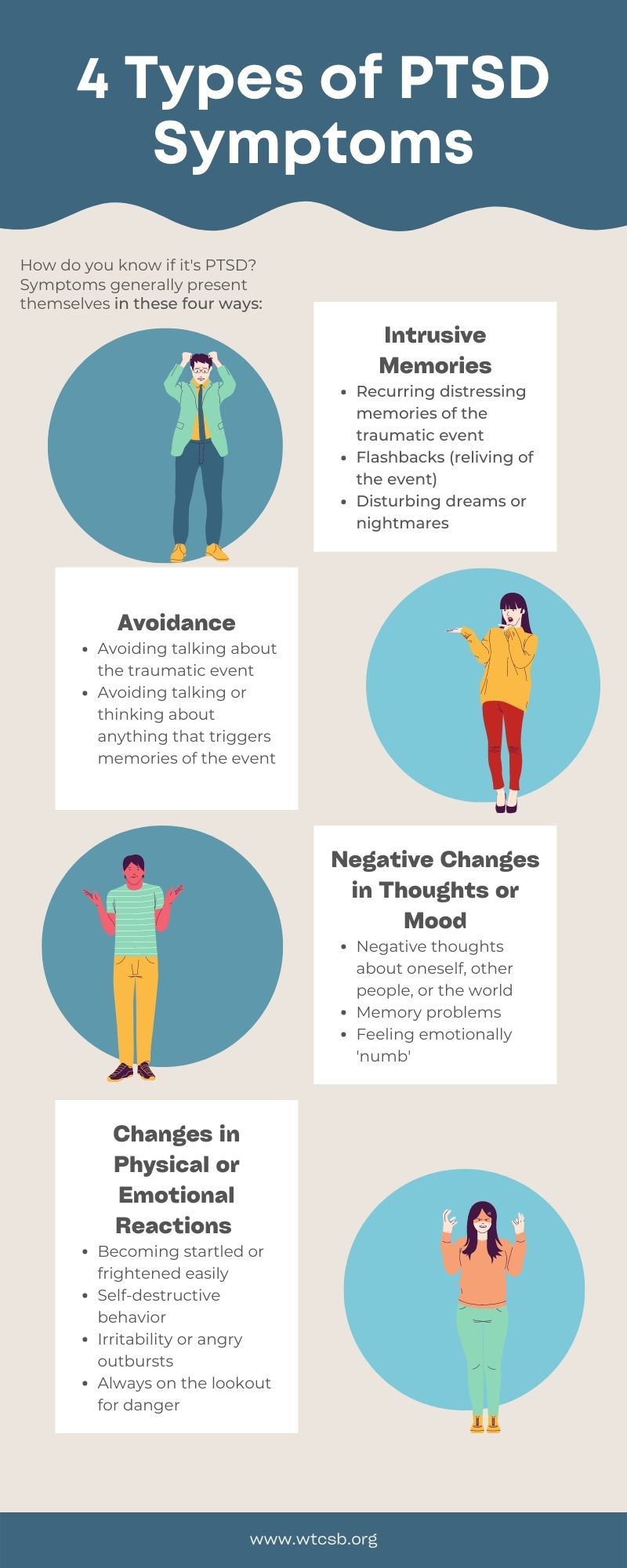We’ve all heard of post-traumatic stress disorder (PTSD), but it doesn’t always show itself the way it’s portrayed in the media. PTSD isn’t something that only war veterans deal with, and it’s not just panic attacks. The truth is that it’s often caused by more common experiences and can manifest itself in several ways. So what exactly is PTSD – and how do you handle it?
What is PTSD?
According to the Mayo Clinic, post-traumatic stress disorder is a mental health condition that’s “triggered by a terrifying event – either experiencing it or witnessing it.” Symptoms of PTSD can begin within a month of the event but sometimes don’t start until years afterwards. These symptoms can cause significant problems, often interfering with both a patient’s work or school performance and their personal life.
PTSD symptoms are typically grouped into four types:
Intrusive Memories
These may include not only recurring distressing memories of the traumatic event, but flashbacks (reliving the event as if it were happening again), upsetting dreams or nightmares, or severe emotional or physical reactions to something that reminds you of the event.
Avoidance
Avoidance may include avoiding talking about the event, or even avoiding anything that reminds you of the event – like people, places or certain activities.
Negative Changes in Thoughts or Mood
This can include negative thoughts (about yourself, other people or the world), hopelessness, memory problems (especially when it comes to the traumatic event), difficulty maintaining close relationships, or feeling emotionally ‘numb.’
Change in Physical and Emotional Reactions
PTSD can cause someone to become startled or frightened easily (often jumping or screaming at things they hear or see suddenly), engage in self-destructive behavior (like drinking too much or driving too fast), have trouble sleeping or concentrating, or experience irritability or angry outbursts. They may also appear to always be on the guard for danger.
This can present itself in a variety of ways:
- They’re often uneasy in public places or other places they feel unsafe and may have rituals to make them feel more secure
- Choosing a certain seat where they can see all around them, looking at strangers closely to make sure they don’t appear dangerous, or
- Constantly checking their surroundings. Many people with PTSD don’t even realize they are doing this.
Younger children (6 years of age and younger) may also re-enact the traumatic event or aspects of the event through play, or experience nightmares that may or may not include aspects of the event.
Causes of PTSD
PTSD results from experiencing, witnessing or sometimes even learning about a traumatic event. PTSD can happen as a result of any event where someone experiences trauma – the threat of death (or a perceived threat of death), violence, sexual or physical assault, abuse or neglect, accidents or natural disasters, severe injuries or terminal illness, or witnessing violence or death.
Factors that increase the risk of developing PTSD include substance misuse or abuse, experiencing intense or long-lasting trauma or trauma earlier in life (like childhood abuse), lacking a good support system, or having a history of mental health concerns like depression, panic disorder, or OCD.
Most people will experience at least one trauma in their lives, but not everyone develops PTSD. In the United States, about 6% of the population will have PTSD at some point in their lives.
What To Do If You’re Experiencing a Crisis Related to PTSD
A mental health crisis is “any situation in which a person’s behavior puts them at risk of hurting themselves or others and/or prevents them from being able to care for themselves or function effectively in the community.”
If someone is experiencing a PTSD-related crisis, their symptoms may be preventing them from functioning in their relationships or day-to-day life, or may have caused them to have thoughts about hurting themselves or other people.
If someone you know is experiencing this, it can be scary, but you can help.
How you can help someone in a PTSD-related crisis:
- Assess the situation: Are they in danger of hurting themselves or others?
- Speak clearly, slowly, and calmly.
- Announce what actions you’re going to take before you do so.
- Offer options instead of telling them what they should do; Let them feel in control.
- Reduce stimulation. You may do this by keeping lights off or low and by keeping TVs or music off.
- Offer to help them cope in a healthy way: suggest going on a walk, meditating, or talking out their thoughts and feelings.
What not to do in a PTSD-related crisis:
- Don’t make them feel trapped. Instead, give them physical space.
- Don’t touch them without their permission.
- Don’t make judgmental comments (“Why are you doing this?” “You’re being silly.”)
- Don’t argue or try to reason with them.
You may be able to help someone in a crisis by offering empathy and support and by de-escalating the situation and helping them to cope with their feelings, but if the situation is dangerous, you will probably need to call for help.
If you dial 911, someone will come to assist you, but it will most likely be the police and they are often not trained in mental health issues.
However, you can ask the operator to send you a Crisis Intervention Training (CIT) officer, if the program is available in your area.
Your Relief is Our Priority
If you or someone you know is experiencing a crisis, you can call our 24- hour Emergency Services line at 757-925-2484.
We can provide you with a phone consultation, counseling, substance abuse inpatient treatment, admission screenings for crisis stabilization, or a psychiatric hospitalization.
We are trained mental health professionals, and we are here to help, anytime you need us, 24/7.
Call us or make an appointment for same-day access online.







